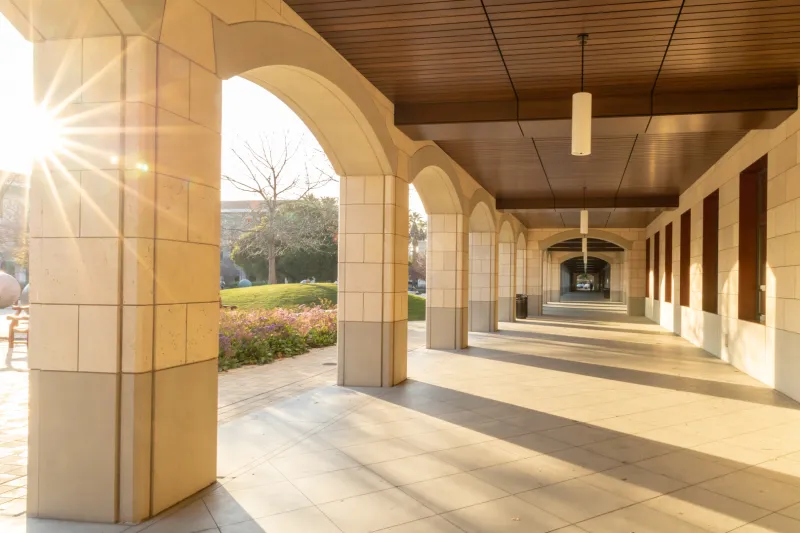Last week, over 1000 Stanford students gathered to hear about the latest developments in artificial intelligence (AI) from OpenAI CEO Sam Altman at NVIDIA Auditorium as part of the Entrepreneurial Thought Leaders’ Seminar.
After Altman’s talk, professors and leaders at the Stanford Technology Ventures Program (STVP) shared their perspectives on the AI revolution with The Daily. They discussed the excitement among Stanford students, the need for responsible AI development and the potential impact of AI on society.
Charles (Chuck) Eesley, associate professor of Management Science and Engineering and faculty director of STVP, underscored how enthusiastic Stanford students seem about the potential of AI.
“Students are particularly excited about AI right now due to its immense potential to drive innovation and shape the future of various industries,” Eesley wrote.
Eesley mentioned that STVP provides students who are interested in “entrepreneurship, technology, and their impacts on society” with a range of resources, educational programs and mentorship opportunities. STVP denotes itself as Stanford’s Engineering Entrepreneurship Center and is led by a team of Stanford instructors and former tech executives.
Although right now the AI field is currently dominated by the technology and engineering domains, he predicts it will diversify in the future.
Current uses of AI range from artistic endeavors to translating languages to menial tasks like writing an email.
According to Eesley, “We are likely to see more interdisciplinary collaboration, bringing together students and experts from diverse fields such as computer science, engineering, social science and humanities to address the multifaceted challenges and opportunities presented by AI.”
Eesley also echoed Altman’s emphasis on the importance of developing AI responsibly and inclusively. “Our main interests revolve around how we can shape the design of these algorithms and regulatory frameworks to benefit not only the wealthy and powerful, but also to protect user privacy and the more marginalized segments of society,” Eesley wrote.
Mo Lei Fong, Executive Director of STVP, which runs the Entrepreneurial Thought Leaders’ Seminar and podcast series, believes that student enthusiasm for the field stems, at least in part, from their adapting education.
“Stanford students not only sense the power of AI but have experienced it firsthand in their classes as more faculty are incorporating it into their teaching,” Fong wrote.
Ravi Belani, Adjunct Lecturer in Management Science & Engineering and instructor of the Entrepreneurial Thought Leaders’ Seminar, echoed how novel AI is, “We are all living in a watershed moment with how AI is transforming our lives, and the world.”
It’s not just computer science classes that now have to think about AI. According to Belani, teachings on artificial intelligence cut across the University.
And he’s not exaggerating. A quick search for “artificial intelligence” on ExploreCourses, Stanford’s course-seeking tool, yields results in the American Studies, Art History, Biology and English departments, as well as many more.
When asked about the future outlook of AI, Fong was cautiously optimistic regarding the rapid societal changes the technology is poised to bring about.
According to Fong, as AI evolves, “so will its uses and regulations. AI is a technology that will be as fundamental to our daily lives as the discovery of fire and the invention of the wheel.”
Belani highlighted how rapidly AI is advancing. “The pace of the release of the models, and their capabilities is surprising even to those steeped in the field,” he wrote.
Citing up-and-coming AI-related applications, Fong noted the broad range of impact AI will have on various jobs and industries. According to Fong, AI can be applied to a variety of industries, from retail to medicine to agriculture.
As for the future, Belani expressed excitement about the potential for personalized AI models.
“The most exciting applications will likely be the ones we can’t predict. But I am intrigued by the introduction of memory to Large Language Model (LLM) applications, where you can create deeply personalized models catered specifically to you, built off of a life of digital data and tuned exquisitely to one’s individual full life experience,” he wrote.
Eesley noted that students interested in AI are in the right place at the right time.
“The great thing about Stanford is that the next generation of AI-related applications is being built by […] our community. This is what excites me every day about teaching Stanford students,” Eesley wrote.
